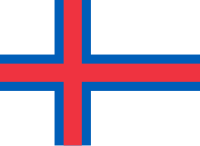 The Faroe Islands (Faroese: Føroyar, Danish: Færøerne) are an island group situated between the Norwegian Sea and the North Atlantic Ocean, approximately halfway between Great Britain and Iceland. The Faroe Islands are a constituent country of the Kingdom of Denmark, along with Denmark proper and Greenland.
The Faroe Islands (Faroese: Føroyar, Danish: Færøerne) are an island group situated between the Norwegian Sea and the North Atlantic Ocean, approximately halfway between Great Britain and Iceland. The Faroe Islands are a constituent country of the Kingdom of Denmark, along with Denmark proper and Greenland.
The Faroe Islands have been an autonomous province of the Kingdom of Denmark since 1948. Over the years, the Faroese have been granted control of most matters. Some areas still remain the responsibility of Denmark, such as military defence and foreign affairs.
The Faroe Islands were politically associated with Denmark in 1380, when Norway entered the Kalmar Union with Denmark and Sweden, which gradually evolved into Danish control of the islands, but this association ceased in 1814. The Faroe Islands have two representatives on the Nordic Council, as members of the Danish delegation.
First settled by Irish monks (c. 700), the islands were colonized by the Vikings (c. 800) and were ruled by Norway from the 11th century until 1380, when they passed to Denmark. They unsuccessfully sought independence in 1946 but received self-government in 1948. In the early 21st century they continued discussions with Denmark on full independence.
Culture of the Faroe Islands has its roots in the Nordic culture. The Faroe Islands were long isolated from the main cultural phases and movements that swept across parts of Europe. This means that they have maintained a great part of their traditional culture. The language spoken is Faroese and it is one of three insular Scandinavian languages descended from the Old Norse language spoken in Scandinavia in the Viking Age, the others being Icelandic and the extinct Norn, which is thought to have been mutually intelligible with Faroese.
Until the 15th century, Faroese had a similar orthography to Icelandic and Norwegian, but after the Reformation in 1538, the ruling Danes outlawed its use in schools, churches and official documents. Although a rich spoken tradition survived, for 300 years the language was not written down. This means that all poems and stories were handed down orally. These works were split into the following divisions: sagnir (historical), ævintýr (stories) and kvæði (ballads), often set to music and the mediaeval chain dance). These were eventually written down in the 19th century.
The Faroese economy is dependent on fishing, which makes the economy vulnerable to price swings. The sector accounts for 95% of exports and nearly half of GDP. Since 2003 the Faroese economy has picked up as a result of higher prices for fish and for housing. Unemployment is minimal and government finances are relatively sound. Oil finds close to the Islands give hope for economically recoverable deposits, which could eventually lay the basis for a more diversified economy and lessen dependence on Danish economic assistance. Aided by a substantial annual subsidy (about 15% of GDP) from Denmark, the Faroese have a standard of living not far below the Danes and other Scandinavians.
Notes from Wikipedia and Answers.com









